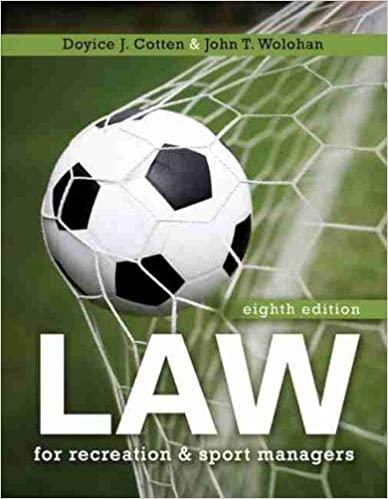Question
In Cooper Tire & Rubber v. Mendez, involving a tire blowout that resulted in deaths in an accident, the Texas high court held that: Group
In Cooper Tire & Rubber v. Mendez, involving a tire blowout that resulted in deaths in an accident, the Texas high court held that:
Group of answer choices
the head of a corporation is never required to testify in a deposition
the head of a corporation is only required to answer written interrogatories, not appear for a deposition
the expert witness for Cooper could not be a company employee
the head of a corporation may send a qualified corporate officer to testify in his place
In Cooper Tire & Rubber v. Mendez, involving a tire blowout that resulted in deaths in an accident, the Texas high court held that:
Group of answer choices
the expert for plaintiff Mendez failed to meet the standard of reliability, so there would be a new trial
the expert witness for Cooper failed to meet the standard for reliability, so that testimony would be stricken from the record
the expert for plaintiff Mendez failed to meet the standard of reliability, so it reversed the judgment to be in favor of Cooper
the expert witness for Cooper could not be a company employee, it had to be an independent expert
If one party to a lawsuit requests the production of documents that would expose a trade secret, the party against whom the request is made may procure the following to ensure the confidentiality of the secret:
Group of answer choices
a deposition
a counterclaim
an injunction
a protective order
Suppose both sides in a suit agree about certain facts, so they do not need to be proven at trial. To settle facts about which there is no real dispute, the parties may use:
Group of answer choices
sanctions
requests for admissions
expert witness commentary
protective order for documents
If the mental or physical condition of a party to a suit is an issue raised by the other party the:
Group of answer choices
court will only allow evidence from the experts of the plaintiff's choosing
court cannot require an examination since that violates the constitutional right to privacy about medical issues
court will sanction a rule to comply
party requesting the order must show a greater need for this information than for other kinds of discovery
If a party refuses to comply with a court order to produce documents or answer written interrogatories:
Group of answer choices
nothing can be done, since no one can be forced to answer questions; the trial must proceed as best it can
the court can find the party in contempt of court, which can result in fines or imprisonment
the court can declare a mistrial and order the procedure to begin again
nothing can be done at that time, but the questions can be asked again during the trial to show the judge and jury that the party would not provide relevant information
A person is injured in an accident involving a GM car. The person sues GM, claiming the design of the vehicle was defective. They claim that they must ask the president of GM certain questions. The president:
Group of answer choices
must appear at any trial at which he is requested as a witness
may designate subordinates to give testimony at trial on his behalf
may designate subordinates to answer questions for him at a deposition
usually will not have to appear at the trial, but may have to give a deposition
In the federal courts the right to a jury trial is guaranteed:
Group of answer choices
in no cases; juries are only used in state courts
only in criminal cases, not in civil cases
in common law cases in which over $20 is in dispute
in all cases
During the selection of a jury from the jury pool, attorneys:
Group of answer choices
may reject any potential juror without restriction
may request to meet with potential jurors in private
may insist on a jury with 12 jurors
are usually allowed to reject some jurors without any reason
Following the opening statements at a trial, the:
Group of answer choices
defendant goes first since he has the burden of proving the plaintiff's arguments are wrong
plaintiff goes first in civil cases, the defendant goes first in criminal cases
plaintiff goes first since she has the burden of proving that her arguments are correct
judge decides who goes first depending on the type of case
Step by Step Solution
There are 3 Steps involved in it
Step: 1

Get Instant Access to Expert-Tailored Solutions
See step-by-step solutions with expert insights and AI powered tools for academic success
Step: 2

Step: 3

Ace Your Homework with AI
Get the answers you need in no time with our AI-driven, step-by-step assistance
Get Started


